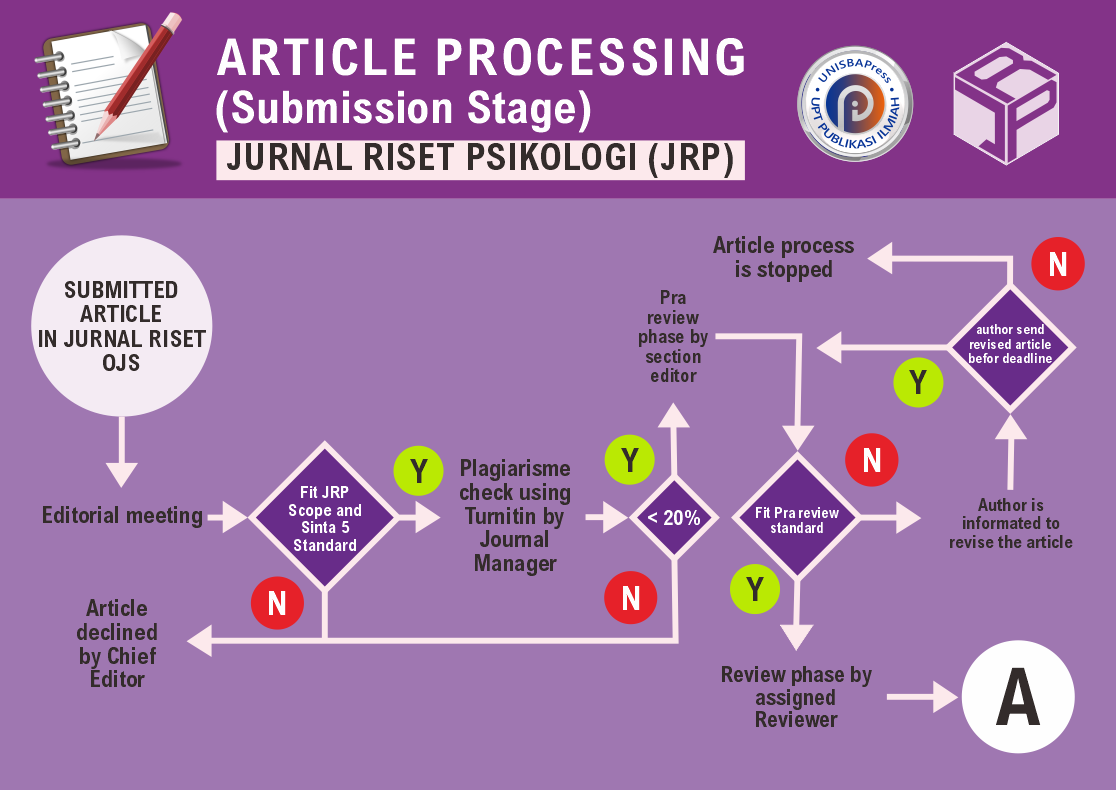Pengaruh Resilience at Work terhadap Subjective Well-Being pada Perawat Rumah Sakit Jiwa
DOI:
https://doi.org/10.29313/jrp.v3i1.1982Keywords:
Resilience at Work, Subjective Well-Being, Perawat RSJAbstract
Abstract. The adaptability of individuals to deal with problems that occur in their lives can be a determining factor for the value of subjective well-being, whether low or high (Nayana, 2013). Resilience ability is needed to deal with stress and increase SWB in individuals (Rakhmadianti, et al., 2021). This study aims to obtain empirical data on the effect of Resilience at Work on Subjective Well-Being in Mental Hospital nurses. This research was conducted on Mental Hospital Nurses with the number of respondents as many as 85 nurses. The measuring instrument used is the resilience at work scale from Malik and Garg (2018) which was adapted by researchers and the SPANE (Scale of Positive and Negative Experience) measurement by Diener and Robert (2009) and SWLS (Satifaction with Life Scale) by Diener, Emmon, Larsen, and Griffy (2009) adapted by Desi, et al. (2019). The analysis technique uses the SEM-PLS method. The results showed that resilience at work had a positive and significant effect on Subjective Well-Being on the affective component of 72.3% and on the cognitive component of 65.5%. From the test of each aspect of resilience at work, the aspects that have a significant influence on subjective well-being on the affective component are living authentically and staying healthy.
Abstrak. Kemampuan adaptasi yang dimiliki individu untuk menghadapi permasalahan yang terjadi dalam hidupnya dapat menjadi faktor penentu nilai subjective well-being, apakah rendah atau tinggi (Nayana, 2013). Kemampuan resiliensi dibutuhkan untuk menghadapi stress dan meningkatkan SWB pada individu (Rakhmadianti, et al., 2021). Penelitian ini bertujuan untuk mendapatkan data secara empirik mengenai pengaruh Resilience at Work terhadap Subjective Well-Being pada perawat Rumah Sakit Jiwa. Penelitian ini dilakukan pada Perawat Rumah Sakit Jiwa dengan jumlah responden sebanyak 85 perawat. Alat ukur yang digunakan yaitu resilience at work scale dari Malik dan Garg (2018) yang diadaptasi oleh peneliti dan alat ukur SPANE (Scale of Positive and Negativ Experience) oleh Diener dan Robert (2009) dan SWLS (Satifaction with Life Scale) oleh Diener, Emmon, Larsen, dan Griffy (2009) yang diadaptasi oleh Desi, et al. (2019). Teknik analisis menggunakan metode SEM-PLS. Hasil penelitian menunjukkan resilience at work memberikan pengaruh positif dan signifikan terhadap Subjective Well-Being pada komponen afektif sebesar 72,3% dan pada komponen kognitif sebesar 65,5%. Dari uji setiap aspek resilience at work, aspek yang memberikan pengaruh signifikan terhadap subjective well-being pada komponen afektif yaitu living authentically dan staying healthy
References
[2] Rakhmadianti D., Kusdiyati S., & Borualogo I. (2021). Pengaruh Resiliensi Terhadap Subjective Well-Being Pada Remaja Di Masa Pandemi COVID-19. Prosiding Psikologi, 7(2), 478–483. https://doi.org/10.29313/.v0i0.28407
[3] Malik, P., & Garg, P. (2018). Psychometric Testing of the Resilience at Work Scale Using Indian Sample. VIKALPA The Journal for Decision Makers, 43(2) 77–91.
[4] Desi, Tanti, & Ranimpi, Y. Y. (2019). Subjective Well-Being Perawat Yang Bekerja Di RS Jiwa Prof. Dr. Soerojo Magelang. Jurnal Insight Fakultas Psikologi Universitas Muhammadiyah Jember, 15(2), 163–179. http://jurnal.unmuhjember.ac.id/index.php/INSIGHT/article/view/Des/2312
[5] Diener, E., Oishi, S., & Lucas, R. E. (2009). Subjective well-being: The science of happiness and life satisfaction. In S. J. Lopez & C. R. Snyder (Eds.), Oxford handbook of positive psychology, 187–194. https://doi.org/10.1093/oxfordhb/9780195187243.013.0017
[6] Argyle, Michael. (2001). The Psychology of Happiness. New York: Routledge.
[7] Lyubomirsky S., Sheldon K. M., & Schakade, D. (2005). Pursuing Happines: The Architecture of Sustainable Change. Review of General Psychology, 9(2), 111-131.
[8] Sucipto, & Saleh. (2019). Individual Needs Terhadap Subjective Well-Being. TAZKIYA: Journal of Psychology, 7(1), 42–48. http://dx.doi.org/10.15408/tazkiya.v7i1.13503
[9] Pavot, W., & Diener E. (2004). Findings on Subjective Well-Being: Applications to Public Policy, Clinical Interventions, and Educations. Dalam P. A Linley & S. Joseph (Eds.), Positive Psychology in Pratice, 679-692. New Jersey: John Wiley & Sons, Inc.
[10] Masten, A. S. (2001). Ordinary Magic: Resilience Processes in Development. American Psychologist, 56(3), 227–238. https://doi.org/10.1037/0003-066X.56.3.227
[11] Ungar, M. (2006). Nurturing hidden resilience in at-risk youth in different cultures. Journal of the Canadian Academy of Child and Adolescent Psychiatry, 15(2), 53.
[12] Listiyandini, R. A., Nathania, A., Syahniar, D., Sonia, L., &Nadya, R. (2015). Mengukur Rasa Syukur: Pengembangan Model Awal Skala Bersyukur Versi Indonesia. Jurnal Psikologi Ulayat: Indonesian Journal of Indigenous Psychology, 2(2), 473-496.
[13] Utsey, S. O., Hook, J. N., Fischer, N., & Belvet, B. (2008). Cultural Orientation, Ego Resilience, and Optimism as Predictors of Subjective Well-Being in African Americans. The Journal of Positive Psychology, 3(3), 202–210. doi:10.1080/17439760801999610
[14] Winwood, P. C., Colon, R., Psych, M. O., & McEwen, K. (2013). A Practical Measure of Workplace Resilience: Developing the Resilience at Work Scale. American College of Occupational Medicine, 55(10).
[15] Oates, J., Jones, J., & Drey, N. (2016). Subjective Well-Being of Mental Health Nurses in The United Kingdom: Results of an Online Survey. International Journal of Mental Health Nursing. doi:10.1111/inm.12263
[16] Foster, K., Cuzzillo, C., & Furness, T. (2018). Strengthening Mental Health Nurses’ Resilience through a Workplace Resilience Programme: A Qualitative Inquiry. Journal of Psychiatric and Mental Health Nursing, 25(5-6), 338-348. https://doi.org/10.1111/jpm.12467
[17] Gao, T., Ding, X., Chai, J., Zhang, Z., Zhang, H., Kong, Y., & Mei, S. (2017). The Influence of Resilience on Mental Health: The Role of General Well-Being. International Journal of Nursing Practice. e12535. doi: 10.1111/ijn.12535
[18] Bakker, A. B., & Oerlemans, W. G. M. (2012). Subjective well-being. In K. S. Cameron & G. M. Spreitzer (Eds.), The Oxford handbook of positive organizational scholarship (pp. 178–187). Oxford University Press.
[19] Oerlemans, W. (2011). Subjective well-being in organizations. 10.13140/2.1.1145.4723.
[20] Bajaj, B., & Pande, N. (2015). Mediating Role of Resilience in The Impact of Mindfulness on Life Satisfaction and Affect as Indices of Subjective Well-Being. Personality and Individual Differences. doi:10.1016/j.paid.2015.09.005
[21] Prayag, G., Spector, S., & Orchiston, C. (2019). Current Issues in Tourism Psychological Resilience, Organizational Resilience and Life Satisfaction in Tourism Firms: Insights From The Canterbury Earthquakes. Current Issues in Tourism, 1–18. https://doi.org/10.1080/13683500.2019.1607832













